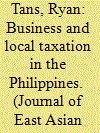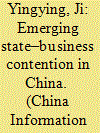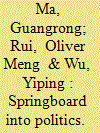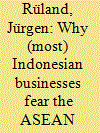|
|
|
Sort Order |
|
|
|
Items / Page
|
|
|
|
|
|
|
| Srl | Item |
| 1 |
ID:
077224


|
|
|
|
|
| Publication |
2007.
|
| Summary/Abstract |
In the 1990s, Bolivia's indigenous population mobilized to claim new political roles, and in the process, directly challenged the privileged position of economic elites within national political institutions. In response, business associations in Santa Cruz, Bolivia's most prosperous region, began to demand regional autonomy-in contrast to the demand for authoritarianism that characterized prior generations of business elites when confronted with threatening political change. After examining Santa Cruz' past relationship with the national government, this article explores the challenges that led economic elites in the department to seek autonomy and the strategies that they have adopted in pursuit of this goal.
|
|
|
|
|
|
|
|
|
|
|
|
|
|
|
|
| 2 |
ID:
148948


|
|
|
|
|
| Summary/Abstract |
This study assesses the capabilities of business associations for conducting meaningful policy engagements with government. Using information from 21 associations and five state institutions, this work investigates the level of autonomy and ability of business associations to coordinate and order their interests for policy decision-making. Findings reveal that the ability to organise an association's own interests is hindered by weak systems and internal structures, especially at sub-sector level. Most associations are financially weak, have limited professional expertise and experience a low level of commitment from members, which affects their capacity for autonomy. It is important that business associations create regulations to make membership ties binding, so as to strengthen their influence on policy. Associations should also be more aggressive in mobilising finances, and they should identify synergies and develop partnerships with the state to build their capacity for participating in policy-making.
|
|
|
|
|
|
|
|
|
|
|
|
|
|
|
|
| 3 |
ID:
177617


|
|
|
|
|
| Summary/Abstract |
This article argues that weak local governments increase levels of taxation by “borrowing” institutional capacity from certain types of businesses. While many businesses lobby against taxation, businesses that are locally owned, nationally connected, and logistically complex build robust associations that support taxation. These types of businesses benefit from improvements in public infrastructure, so they empower their associations to monitor members’ tax compliance and to pressure officials to uphold their spending commitments. The article demonstrates the necessity of business support for taxation in the absence of state capacity by comparing two Philippine cities that differ in their ability to tax despite a number of similarities between them. The case studies show that tax increases co-varied with business support, and that business support waxed and waned depending on over-time variation in the capability of business associations to discourage tax evasion and to enforce official commitments to spend on infrastructure.
|
|
|
|
|
|
|
|
|
|
|
|
|
|
|
|
| 4 |
ID:
071460


|
|
|
|
|
| Publication |
2006.
|
| Summary/Abstract |
Drawing on a unique set of surveys, this article explores the question of whether Russia's post-communist business associations are generally antithetical to or supportive of the broad objectives of economic restructuring. Contrary to the most widely cited analysis as to the purposes of collective action in the business community, the survey evidence demonstrates that association members have embraced market-adapting forms of behaviour at greater rates than non-members. The responses of both firms and associations, moreover, suggest that the associations themselves are, at least in part, directly responsible. These findings point to the conclusion that in contemporary Russia the net returns to collective action in support of market development are high relative to those for purposes that are less supportive.
|
|
|
|
|
|
|
|
|
|
|
|
|
|
|
|
| 5 |
ID:
162352


|
|
|
|
|
| Summary/Abstract |
Based on an in-depth case study of a business association, this article explores how private entrepreneurs are organizing for their rights and highlights contentious facets of the state–business relationship in China. In contrast to depictions common in the literature, this business association actively asserts and seeks to maintain its autonomy vis-a-vis the state and uses innovative strategies to strengthen its own organizational cohesion. It organizes collective actions to defend members’ interests and to enhance the transparency and accountability of the local government. It even advances universal values, such as equal rights to justice. Importantly, however, the initiation and effects of collective actions are contingent on the opportunities embedded in China’s fragmented governance structure. I argue that corporatist analyses characterizing Chinese business associations as lacking autonomy and as partners of the state have overlooked such associations’ potential to engage in confrontations with the state. Combining involvement in the formal institution and contentious collective actions, the association studied displays the tension between the incorporation system and social resistance in contemporary China.
|
|
|
|
|
|
|
|
|
|
|
|
|
|
|
|
| 6 |
ID:
144542


|
|
|
|
|
| Summary/Abstract |
Through an investigation of the Shenzhen Collective Consultation Ordinance and the Guangdong Regulations on the Democratic Management of Enterprises, this article demonstrates how transnational capital in China deploys its associational power alongside its structural economic power to lobby and pressure the national and local governments to advance its own interests. In addition, building upon the ideas of Hall and Soskice about the varieties of capitalism, the authors have developed the concept of “varieties of transnational capital” to account for the differing positions of overseas business associations regarding the two laws. We find that these positions are shaped by two determining factors: a) where the associations are situated in global production chains, and b) the industrial relations model in their home countries.
|
|
|
|
|
|
|
|
|
|
|
|
|
|
|
|
| 7 |
ID:
120812


|
|
|
|
|
| Publication |
2013.
|
| Summary/Abstract |
It is argued in our paper that current studies of civil society in China, which place too much emphasis on its 'independence', are neither practical nor conducive to the sound development of China's civil society, because an adversarial intensification is likely to arise between the state and society. As is shown in our empirical study, despite the fundamental control imposed by the government, Wenzhou Business Association is actively involved in industry governance, constantly empowered by the government, and thus gradually achieves growth and development. This leads to a conclusion that it appears to be a rather more realistic developmental path for China's civil society for associations to make full use of the government's expanding space and to actively participate in public governance.
|
|
|
|
|
|
|
|
|
|
|
|
|
|
|
|
| 8 |
ID:
143366


|
|
|
|
|
| Summary/Abstract |
Business associations in authoritarian regimes behave systematically different from their counterparts in democratic regimes. Using a unique dataset of Chinese private firms, this paper examines the impacts of joining the most prominent business association in China, the All-China Federation of Industry and Commerce (ACFIC) which was initiated and strongly controlled by the government. We find that ACFIC members have much higher chances to obtain formal political identities, that is, the deputy of People's Congress (PC) or the People's Political Consultative Conference (PPCC). However, ACFIC membership itself cannot help entrepreneurs acquire scarce resources that are controlled by the government. Rather, ACFIC members bear heavier tax burdens and make more informal payments to government officials. These findings suggest that the ACFIC act as a springboard into politics, rather than an effective collective action committee that can bring common benefits to its members or protect members from government predation.
|
|
|
|
|
|
|
|
|
|
|
|
|
|
|
|
| 9 |
ID:
144283


|
|
|
|
|
| Summary/Abstract |
By the end of 2015 the Association of Southeast Asian Nations (ASEAN) had ushered in a common market, the ASEAN Economic Community (AEC). However, the groups most affected by it – small businesses – were bypassed in the decision-making process. They are the victims of a selectively inclusive state corporatism which member countries have transferred from their domestic political system to the regional level. In this article I argue that the decision to create the AEC was promoted by ASEAN governments together with foreign economic and local corporate interests. This coalition was able to frame the AEC in a way that small businesses perceived it as a win-win scheme. Empirically the article focuses on Indonesia.
|
|
|
|
|
|
|
|
|
|
|
|
|
|
|
|
|
|
|
|
|